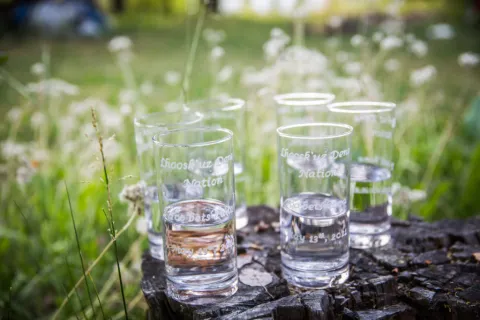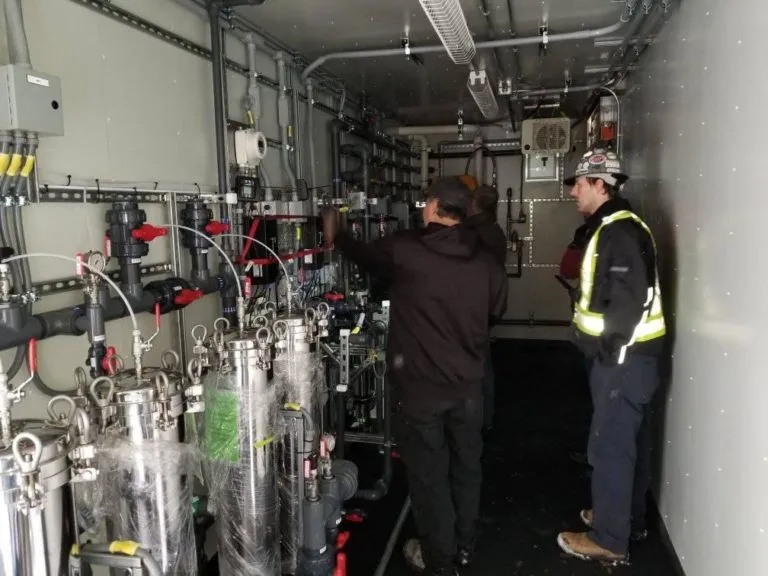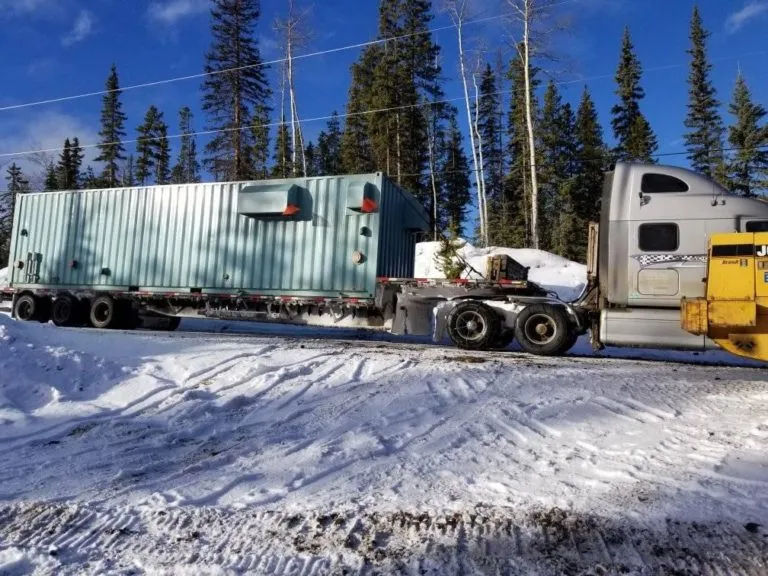Lhoosk’uz Dené village taps into clean water after a 20-year wait

Edited: June 29, 2022
In June 2021, a remote Lhoosk’uz Dené community held a celebration to mark a joyful milestone.
After decades of relying on bottled water, the village of about 50 people, located 200 kilometres west of Quesnel on Kluskus Lake, now has a steady supply of clean drinking water straight out of the tap, thanks to a new water treatment plant crafted to their unique needs.
“We had to do things differently. And now, what was just a dream many years ago is reality,” says Chief Liliane Squinas.
The robust treatment system relies primarily on ultraviolet light, paired with chlorine disinfection, to ensure clean drinking water that is free of harmful microbes. The setup is simple enough that it can be operated, maintained and even repaired without relying heavily on specialist skills or pricey components.
In the past, water treatment solutions for other remote communities foundered for a variety of reasons. Sometimes the system was too complicated or too burdensome to keep running. Other times the solution was simply too big for local conditions.
This time, Lhoosk’uz Dené members were determined to get it right and to build a system that was scaled to their needs, produced good-tasting and safe drinking water and was easy to maintain and repair.

“We’re so off-grid that many people don’t even know where we are. Even the nearest hospital is three hours away,” says Chief Squinas. “If the system breaks down, it’s not as simple as going to the nearest hardware store for replacement parts.”
Tailor-made solution
The community invited a team from UBC’s Faculty of Applied Science and the RESEAU Centre for Mobilizing Innovation to work with them on a solution.
The team, led by chemical and biological engineering professor Dr. Madjid Mohseni, had developed a community-driven and collaborative problem-solving approach known as Community Circle, and were experienced at bringing practical drinking water solutions to rural communities across Canada.
For example, in Northern BC, they had partnered with Tl’azt’en Nation, as well as Indigenous Services Canada, First Nations Health Authority and manufacturing and engineering firms, to develop a treatment system to combat organic contaminants in the community’s water supply. This helped end a 14-year boil-water advisory.
The sheer diversity of the communities involved means there is no one-size-fits-all solution, says Dr. Mohseni.
“More than six million Canadians living in Indigenous and non-urban communities do not have access to reliable clean water to drink. With COVID-19 still a threat, clean water is even more of a necessity,” notes Dr. Mohseni.
Since the early 2000s, the Lhoosk’uz Dené community, formerly known as Kluskus, has relied on untreated water from wells and streams for household needs, and on bottled water delivered year-round.
Its location — accessible only by a single logging road, with even more limited access in winter and during the spring thaw — meant connecting to municipal water was impossible, so community members drew water from a single well. But the water was muddy and subject to E. coli contamination.

In 2008, two new wells were drilled but they were found to contain elevated levels of iron and manganese. Also, they were located in a historic burial area and close to a failing septic field.
“It’s important to work very closely with each community, understanding their unique history, values, culture, geography and long-term vision,” says Dr. Mohseni. “You want a solution that is sustainable and respects local skill sets and priorities.”
All decisions for the new water treatment system were made in close partnership with the Lhoosk’uz Dené members and grounded in understanding local issues, says Dr. Mohseni, adding that the community and their perspectives were at the core of the process.
‘Too bets`huna: We live by water’
Since the treatment system began operating in May, the community has monitored the water supply quality and seen excellent results — clean, good-tasting water.
Band manager Brenda Thomas remembers the day the village elders took their first drink of water from the tap.
“I had glasses engraved with Too bets`huna, which in our language means ‘We live by water’,” says Thomas. “As the Elders took their first sips, I had to hold back tears as the reality hit me. We’d done it, after years of waiting, after hundreds of conference calls and numerous forest fires and despite being in the middle of a pandemic. We were resilient and persevered.”
Thomas adds that she hopes the success of the project will inspire other communities looking for solutions to their own long-term challenges.
Lhoosk’uz Dené natural resource manager Neil Gauthreau says the partnership with UBC and RESEAU made a big impact. “It allowed us to overcome internal knowledge gaps,” says Gauthreau. “It was also great to work with the engineering students and see their enthusiasm and optimism.”
The Minister of Indigenous Services, the Honourable Marc Miller, congratulated Chief Squinas and the Lhoosk’uz Dené community, saying: “This project is a significant achievement that will provide residents with safe, clean water for many years to come.”
Expanding circles
The trust developed between Lhoosk’uz Dené and RESEAU — due to this project and previous interactions — is forging closer ties for future collaborations. In 2018, UBC’s Indigenous Research Support Initiative (IRSI) was formally invited to support broader research priorities and aspirations for Lhoosk’uz Dené, as well as its neighbouring nations, Nazko and Lhtako Dené.
Learn More
- Blue and Goldcast - Episode 28: Chief Liliane Squinas And Dr. Madjid Mohseni
This article originally appeared on UBC News.


